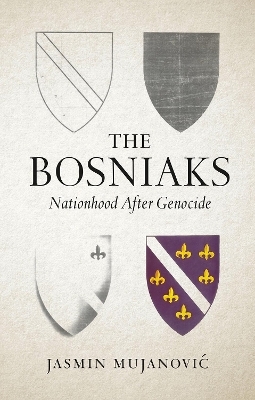
The Bosniaks
Nationhood After Genocide
Seiten
2023
C Hurst & Co Publishers Ltd (Verlag)
978-1-80526-046-2 (ISBN)
C Hurst & Co Publishers Ltd (Verlag)
978-1-80526-046-2 (ISBN)
A compelling exploration of Bosniak political identity, chronicling the development of a nation and its people in the wake of catastrophe.
For the first time in nearly two centuries, one ethnic group now constitutes an absolute majority of Bosnia and Herzegovina's population: the Bosniaks. It is an unlikely development given that, scarcely thirty years ago, they were targeted for extermination and expulsion by Serbia's Slobodan Milošević. Even as the Bosniak community fought to survive these atrocities, it simultaneously came under attack from militants led by Croatian president Franjo Tuđman, who attempted to partition Bosnia and Herzegovina between Zagreb and Belgrade.
Improbably, the Bosniaks and the Bosnian state survived these campaigns. But the country's fractious sectarian post-war order has produced the world's most convoluted constitutional regime, always teetering on the brink of collapse.
Jasmin Mujanović illuminates the sources of contemporary Bosniak political identity, tracing the evolution of a religious community into a secular nation, and shedding light on the future of a nation at a crossroads. He explores the idea of Bosnia and Herzegovina as a 'national homeland', considers how narratives of genocide influence self-identity, and probes how demographic changes are putting pressure on the country's political framework.
The fate of Bosnia and Herzegovina's peace and democracy rests on the Bosniaks' shoulders--and with it, the stability of all Southeastern Europe.
For the first time in nearly two centuries, one ethnic group now constitutes an absolute majority of Bosnia and Herzegovina's population: the Bosniaks. It is an unlikely development given that, scarcely thirty years ago, they were targeted for extermination and expulsion by Serbia's Slobodan Milošević. Even as the Bosniak community fought to survive these atrocities, it simultaneously came under attack from militants led by Croatian president Franjo Tuđman, who attempted to partition Bosnia and Herzegovina between Zagreb and Belgrade.
Improbably, the Bosniaks and the Bosnian state survived these campaigns. But the country's fractious sectarian post-war order has produced the world's most convoluted constitutional regime, always teetering on the brink of collapse.
Jasmin Mujanović illuminates the sources of contemporary Bosniak political identity, tracing the evolution of a religious community into a secular nation, and shedding light on the future of a nation at a crossroads. He explores the idea of Bosnia and Herzegovina as a 'national homeland', considers how narratives of genocide influence self-identity, and probes how demographic changes are putting pressure on the country's political framework.
The fate of Bosnia and Herzegovina's peace and democracy rests on the Bosniaks' shoulders--and with it, the stability of all Southeastern Europe.
Jasmin Mujanović is a political scientist specialising in Southeastern Europe. His first book, 'Hunger and Fury: The Crisis of Democracy in the Balkans' (also published by Hurst), examined the persistence of illiberal governance in the Western Balkans since the Yugoslav Wars. He holds a PhD from York University in Canada.
| Erscheinungsdatum | 17.11.2023 |
|---|---|
| Verlagsort | London |
| Sprache | englisch |
| Maße | 138 x 216 mm |
| Themenwelt | Sozialwissenschaften ► Politik / Verwaltung ► Staat / Verwaltung |
| Sozialwissenschaften ► Soziologie | |
| ISBN-10 | 1-80526-046-4 / 1805260464 |
| ISBN-13 | 978-1-80526-046-2 / 9781805260462 |
| Zustand | Neuware |
| Informationen gemäß Produktsicherheitsverordnung (GPSR) | |
| Haben Sie eine Frage zum Produkt? |
Mehr entdecken
aus dem Bereich
aus dem Bereich
Organisationen steuern, Strukturen schaffen, Prozesse gestalten
Buch | Softcover (2024)
Rehm Verlag
38,00 €


